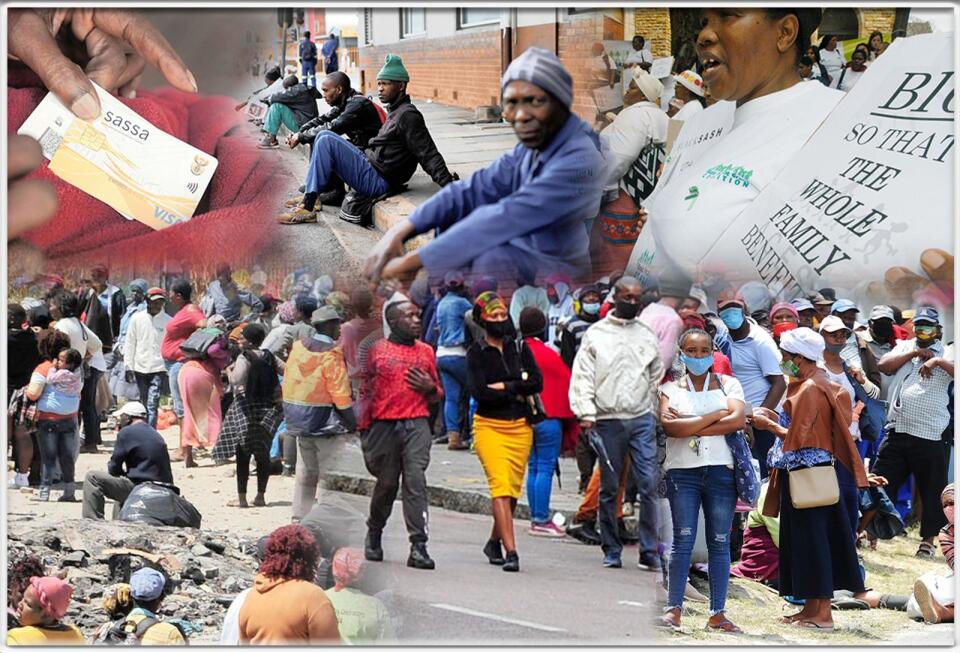
Graphic: Timothy Alexander / African News Agency (ANA) – A framework that focuses on driving people into work cannot accommodate an economy such as South Africa that is characterised by structural unemployment, historically driven dispossession of assets and unequal distribution of skills, resources and opportunities, the writer says.
With the policy battles heating up around the future of the R350 Covid-19 grant, it is important to think carefully about whether the right way to go is universal or targeted – do we want basic income or do we want universal basic income, and why?
Often development economics is preached to the developing world by foreign experts from Northern pulpits. But there are two excellent developmental economists that the South is proud to claim as its own, Amartya Sen and Thandika Mkandawire. Sen was born in Bengal in 1933 and Mkandawire (who sadly passed away in 2020), was born in 1940 in Zimbabwe.
They both have written extensively about welfare policy and both over the years tackled the complexities surrounding the moral and political economy of the choice between universal or targeted access to public goods.
As a specific tool for national social and economic reconstruction after the destruction of Europe in World War II, welfare policies were built on the foundations of universalism. The universal aspect of welfare schemes was an intentional characteristic adopted to promote integration and social cohesion amongst highly divided communities and societies.
In the 1980s, neo-liberal ideology began to dominate economics and welfare debates. The well-being of a person became their own personal matter and was not of concern to the community or the state.
Ironically, given the astounding reconstruction and growth of Europe based on collective welfare, politicians under the aegis of neo-liberal beliefs ignored all of that and began to hark back to a Nineteenth Century notion of the ‘deserving’ versus the ‘undeserving’ poor, which was a pushback then to a century or so of unconditional support as the industrial revolution began to commoditise human beings as work units. Poor people deserving of assistance were children, the elderly and the sick or disabled.
If you were poor and of working age, you must be lazy or dishonest, or suffer from some other pathology that made you undeserving of society’s assistance. Back in the 1980s: welfare schemes became increasingly subject to conditions that beneficiaries had to fulfil. Instead of welfare being a public good, people began to speak of it as a cost to the fiscus and instead of welfare, schemes of ‘workfare’ emerged, where sweat equity was demanded of beneficiaries, like the workhouses of Victorian England.
But this framework that focuses on driving people into work cannot accommodate an economy such as South Africa that is characterised by structural unemployment, historically driven dispossession of assets and unequal distribution of skills, resources and opportunities.
Targeting is done through a variety of methods, including financial means testing, regional targeting such as through a selection of eligible provinces or districts, identification by chiefs and local leaders of who is in need, or self-targeting.
Advocates of targeting argue that targeting ensures that only the truly needy get the benefit, and that allows limited state budgets to be spent more on those who need it.
Universal provision on the other hand is when everyone in a category receives the benefit, regardless of where they live, what they do or what they don’t do.
Categories can be large, such as all citizens of a state, or smaller such as all older people over 60 years old. Universal schemes can be built up from universal categories of support over time, and this has been done in many places towards fully inclusive schemes.
Advocates for universalism argue that targeting is divisive. It shifts the cost of welfare from the collective to the individual, and most poor and marginalised people cannot overcome the obstacles to overcoming their poverty or unemployment. Targeted systems have a high possibility for errors of exclusion, so there needs to be a very effective appeal and review mechanisms in place to protect people wrongfully excluded. Targeting stigmatises the poor and reduces people’s dignity by requiring them to prove that they are poor.
When desperate people misreport their income so that they can receive the benefit, they are criminalised for being poor people who are just trying to get by. The cost factor of administering the targeting criteria– money and time – for the state and the poor individual who needs to negotiate the application process to prove their eligibility, is high.
Targeting completely negates the rights, the basis of any socio-economic right.
Furthermore, it punishes innovation by disqualifying the beneficiary as soon as they make one rand over the means test, which is completely counter-intuitive when countries are encouraging grant recipients to become economically active.
People argue that universal systems make the rich richer because everybody gets the benefit, and so it takes money out of the mouths of the poor. But this is based on the wrong understanding of the taxing-back principle that taxes back the value of the benefit from the rich through progressive tax systems. And if the well-off receive the benefit, they will use their voice to condemn attempts to cut back the benefit. So including the rich protects the interests of the poor.
In South Africa, more than half of all people live in poverty. There are 12.4 million unemployed adults and the same number again of people who report as not in education, employment or training. Close to 13 million adults have spent time and money applying for the R350 grant.
To try to draw a line between poor adults in South Africa, who are deserving of assistance and those who are deemed ‘undeserving’ or lazy, is truly difficult where unemployment in many communities is the norm, not the exception.
All the way back in 1995, Sen observed that any benefit system that demanded that people be identified as poor to be eligible for it must have a profound impact on the psyche of that person, their self-respect and how they see their ability to navigate any situation in healthy and constructive ways.
Mkandawire wrote in 2005 that the choice between targeting and universalism is often dismissed as a choice of administrative methods, but it is in fact a political economy choice of a country about fairness and distribution.
There really is no choice between basic income and universal basic income in South Africa given our past divisions, which are still not healed today and given the prevalence of poverty. Addressing basic income in a universal scheme would be the key to the elusive social cohesion of which leaders talk .
As Sen and Mkandawire wrote so insightfully, social policy choices are about so much more than the numbers
© The African [2022]. All rights reserved.










